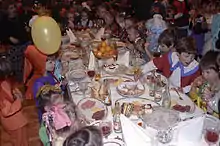Orphans in Russia
As of 2011 from the numbers presented from Russia at the UN states that, Russia has over 650,000 children who are registered orphans, 70% of which arrived in the orphanages in the 1990s. Of these, 370,000 are in state-run institutions while the others are either in foster care or have been adopted.[1] Reports have ranged saying that between 66-95% of all of these children are considered social orphans, meaning that one or more of their birth parents are still alive.[2]
_during_a_community_relations_project.jpg.webp)
Historical background
After the collapse of the Soviet Union, there was an increase in the number of orphans. In 1995, there was a reported 300,000 children in the orphanage system. Although difficult to accurately count, there are an estimated 1 million to 5 million homeless youth.[3] The number of orphanages has increased by 100% between 2002 and 2012 to 2,176.[2] Some of the reasons for children to end up in the orphanages are domestic abuse, parental substance abuse, having lost their parents, or being found alone on the streets.[3] As for those who are social orphans there are various reasons why they end up in orphanages. For instance one girl's parents were told when she was born that she wouldn't live long so her parents refused to take her.[4] Other children have been abandoned due to reasons such as their disabilities, or their parent's drug or substance problems.[4]
Conditions in orphanages
There have been reports over the years that the conditions in the orphanages are not providing proper mental and physical care. Researchers have stated that children 3 and under lose one IQ point for every month spent inside.[5] Children adopted from Russia are also more likely than any other country to have fetal alcohol spectrum disorder. Doctors visiting some of these institutions have even reported seeing toddlers sitting alone, rocking back and forth, staring blankly, or even banging their heads against walls.[5] Children in the 1990s were often not provided with proper nutrition and were not given quality living and sleeping conditions [6]

Transitions out of state institutions
Children are sometimes returned to their orphanage. This is not always due to the wishes of adoptive parents; instead, sometimes children will find it difficult to adjust to living outside of the orphanage and will request to return. In 2011, it was estimated that as many as 4,600 children were returned by their adoptive or foster parents.[1]
In the 1900s, at the age of 16, children have to leave the orphanages. Approximately 15,000 children leave Russian orphanages each year, usually at the age of 16 or 17.[2] They are given housing, benefits, and a stipend, but often are not given sufficient advice or direction on how to transition into the world. The education that they are given is often lacking. Some institutions only provide the children with six grades worth of schooling. This takes away the opportunity to go onto higher education and many will go into vocational schools that only offer a few trades to study.[1] Statistics have shown that of these youth only 4% are admitted to universities, 50% fall into a high-risk category, 40% become involved in crime, 10% commit suicide, 33% stay unemployed, and 20% become homeless.[2]
Adoption ban
In late 2012, Russian President Vladimir Putin approved the Dima Yakovlev Law, prohibiting Russian children from being adopted by American citizens.[7] Those in favor of the bill attributed the need for it to the cases of abuse that have been caused by American adoptive parents. They felt as if the punishment for these parents have been mild for the extent of their crimes. For cases where children had been tortured and have died, only 19 times have the parents been convicted of violent child treatment.[8] Russia's proposed plans to compensate for the loss of American adoptions are to encourage domestic adoptions, boost aid to foster families, facilitating adoption procedures, and raising benefits for foster children.[8]
References
- Odynova, Alexandra (Mar–Apr 2013). "State of the Wards". Russian Life. 56 (2): 28–35.
- "Statistical Snapshots: Russia's Children at Risk". Russian Children's Welfare Society. Archived from the original on 10 March 2013. Retrieved 27 March 2013.
- Rudnicki, Ann A (Winter 2012). "The Development of Russia's Child Protection and Welfare System". Demokratizatsiya. 20 (1): 29–44.
- Whewell, Tim (April 2, 2013). "Russia: Are efforts to help thousands of 'abandoned' children being resisted?".
- Pickert, Kate (June 28, 2010). "Russian Kids in America: When The Adopted Can't Adapt".
- Delaine, Linda (May 1, 2000). "The Plight of Russia's Orphans". Russian Life.
- "Dima Yakovlev Law". RT International. Retrieved 2017-11-19.
- "Putin approves bill banning US adoptions of Russian kids". Russia Today. December 28, 2012.